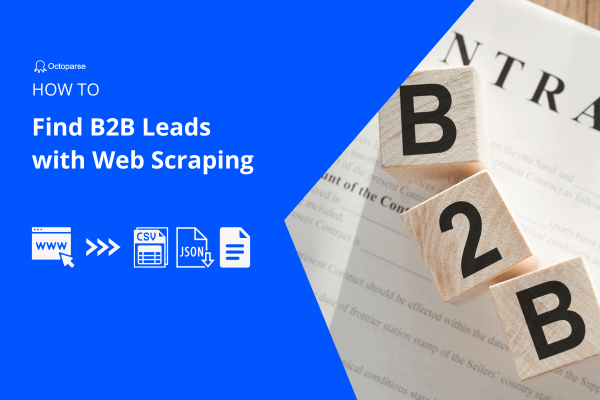
The Digital Transformation of B2B Lead Acquisition
Imagine walking into a vast library where every book contains potential business opportunities, but you‘re limited to reading only a few pages manually. That‘s precisely how traditional lead generation used to work. Web scraping has revolutionized this landscape, transforming how businesses discover, analyze, and engage potential clients.
In the digital era, data has become the most valuable currency. For B2B professionals, web scraping represents a powerful mechanism to unlock hidden market insights, connecting businesses with precisely targeted leads across global markets. This comprehensive guide will walk you through the intricate world of web scraping, revealing strategies that can dramatically transform your lead generation approach.
The Evolving Landscape of B2B Lead Generation
The global B2B lead generation market has undergone unprecedented transformation. Traditional cold-calling and generic marketing approaches are rapidly becoming obsolete, replaced by intelligent, data-driven strategies. Recent market research indicates that companies utilizing advanced web scraping techniques experience up to 45% improvement in lead quality and conversion rates.
Understanding Web Scraping: More Than Just Data Collection
Web scraping isn‘t merely about collecting information—it‘s about extracting meaningful insights that drive strategic business decisions. At its core, web scraping involves sophisticated technological processes that extract structured data from multiple online sources, transforming raw information into actionable intelligence.
The Technical Mechanics Behind Web Scraping
Modern web scraping leverages complex technological ecosystems, combining programming languages, specialized frameworks, and intelligent algorithms. Python-based tools like Scrapy and Beautiful Soup have emerged as industry standards, providing robust mechanisms for extracting intricate data patterns from diverse digital platforms.
Strategic Approaches to B2B Lead Extraction
Identifying High-Value Data Sources
Not all websites are created equal when it comes to B2B lead generation. Professional networking platforms, industry-specific directories, and corporate websites represent treasure troves of potential leads. LinkedIn, for instance, hosts over 875 million professional profiles, making it an invaluable resource for targeted lead acquisition.
Advanced Filtering and Segmentation Techniques
Successful web scraping transcends simple data collection. The real magic happens when you implement intelligent filtering mechanisms that allow you to segment leads based on:
- Industry-specific parameters
- Geographic location
- Company size
- Professional roles
- Technological infrastructure
Legal and Ethical Considerations in Web Scraping
Navigating the complex landscape of data extraction requires a nuanced understanding of legal and ethical frameworks. Different regions maintain varying regulations regarding data collection and privacy.
Compliance Frameworks to Consider
- General Data Protection Regulation (GDPR)
- California Consumer Privacy Act (CCPA)
- Regional data protection standards
Responsible web scraping demands a comprehensive approach that respects individual privacy while extracting valuable business insights.
Technological Tools and Frameworks
Recommended Web Scraping Ecosystem
Several powerful tools have emerged to simplify the web scraping process:
- Scrapy: A comprehensive Python framework for advanced data extraction
- Selenium WebDriver: Enables interaction with dynamic web pages
- Puppeteer: Provides headless browser capabilities
- Beautiful Soup: Simplifies HTML parsing and data extraction
Practical Implementation Strategies
Building a Robust Web Scraping Infrastructure
Successful web scraping requires a multi-layered approach:
Technical Architecture
Develop a flexible infrastructure that can adapt to different website structures and anti-scraping mechanisms.Proxy Management
Implement sophisticated proxy rotation techniques to prevent IP blocking and maintain continuous data extraction capabilities.Error Handling
Create comprehensive error management protocols to ensure consistent and reliable data collection.
Machine Learning and AI Integration
The future of web scraping lies in intelligent, adaptive systems. Machine learning algorithms can now:
- Predict optimal scraping strategies
- Automatically detect website structure changes
- Enhance data quality through intelligent filtering
- Provide real-time adaptation mechanisms
Investment and ROI Considerations
Web scraping represents a strategic investment with significant potential returns. Companies implementing advanced scraping techniques typically observe:
- 35-50% reduction in lead acquisition costs
- Improved targeting precision
- Enhanced market intelligence
- Faster sales cycle progression
Emerging Trends and Future Perspectives
The Next Frontier of Web Scraping
Emerging technologies like blockchain and quantum computing are poised to revolutionize data extraction methodologies. Decentralized verification systems and unprecedented processing capabilities will transform how businesses collect and utilize lead information.
Practical Recommendations for Implementation
- Start with a comprehensive technology audit
- Develop internal scraping capabilities
- Establish robust compliance frameworks
- Pilot advanced extraction projects
- Continuously monitor technological innovations
Conclusion: Navigating the Data-Driven Future
Web scraping has evolved from a niche technological approach to a fundamental business strategy. By embracing intelligent data extraction methodologies, businesses can unlock unprecedented opportunities for growth, engagement, and market understanding.
The journey of web scraping is not just about collecting data—it‘s about transforming raw information into strategic insights that drive meaningful business connections.
Your Next Steps
Are you ready to revolutionize your B2B lead generation approach? The world of web scraping awaits, offering a pathway to more intelligent, targeted, and effective business growth.










